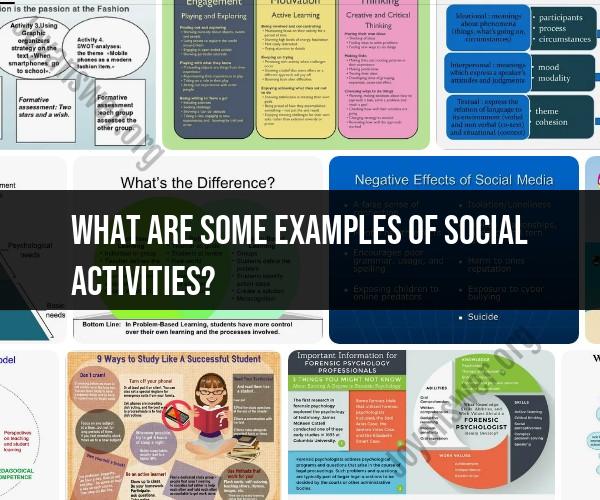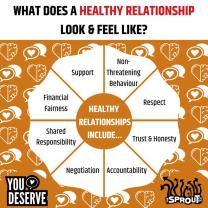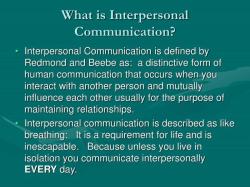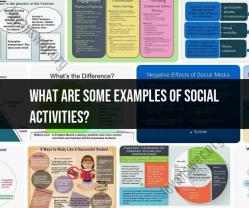What are some examples of social activities?
Social activities are diverse and can encompass a wide range of interactions and experiences that help individuals build relationships, foster connections, and strengthen community bonds. Here are some examples of social activities:
Dinner Parties: Hosting or attending dinner parties with friends or family is a classic social activity. It provides an opportunity for people to gather, share a meal, and engage in conversation.
Game Nights: Game nights with board games, card games, or video games are a fun way for friends and family to spend quality time together and enjoy some friendly competition.
Outdoor Sports: Participating in outdoor sports or recreational activities such as soccer, basketball, hiking, biking, or jogging with friends or teammates encourages physical activity and social interaction.
Book Clubs: Book clubs bring together individuals with a shared interest in literature. Members read a common book and then gather to discuss their thoughts and opinions.
Volunteer Work: Volunteering for a cause or organization allows individuals to give back to the community while forming bonds with like-minded people who share a passion for helping others.
Art and Craft Workshops: Art classes, painting sessions, and craft workshops offer a creative outlet for participants to learn new skills and create art while socializing with fellow enthusiasts.
Cultural Events: Attending cultural events such as music concerts, art exhibitions, theater performances, or festivals provides opportunities to appreciate and discuss various forms of art and culture with others.
Cooking Classes: Enrolling in cooking classes allows participants to learn new culinary skills, prepare dishes together, and enjoy the results as a group.
Fitness Classes: Group fitness classes like yoga, dance, or spinning are not only great for physical health but also provide a social environment to meet others who share a commitment to well-being.
Community Gardening: Joining a community garden or participating in gardening clubs promotes community involvement, allows individuals to connect with nature, and engage in shared gardening projects.
Support Groups: Support groups bring people facing similar challenges or health issues together to share experiences, coping strategies, and emotional support.
Networking Events: Attending professional networking events, conferences, or meetups offers opportunities to connect with peers, exchange ideas, and build business relationships.
Travel Groups: Joining travel or adventure groups allows individuals with a passion for exploring new places to embark on journeys together and create lasting memories.
Language Exchange: Language exchange programs enable people to learn new languages and cultures by conversing with native speakers in their native language.
Community Cleanup: Participating in community cleanup efforts and environmental initiatives fosters a sense of pride in one's neighborhood and encourages teamwork.
Community Meetings: Attending local community meetings and town hall events provides a platform for residents to voice concerns, collaborate on neighborhood projects, and engage with local government.
Educational Workshops: Educational seminars, workshops, and lectures provide opportunities to expand knowledge and engage in intellectual discussions with experts and peers.
Charity Runs/Walks: Charity runs and walks raise funds for various causes while encouraging physical activity and community involvement.
Arts and Crafts Fairs: Visiting arts and crafts fairs and markets offers a chance to explore handmade creations, support local artisans, and interact with the creative community.
Festive Celebrations: Celebrating holidays, birthdays, weddings, and other special occasions with friends and family is a joyful way to strengthen social bonds and create cherished memories.
These examples represent a wide array of social activities that cater to different interests, age groups, and preferences. Engaging in such activities can enhance social connections, promote well-being, and contribute to a sense of belonging within a community or social circle.
The Importance of Social Work: Addressing Critical Social Issues
Social work is a profession that promotes social change, problem solving in human relationships, and the empowerment and liberation of people. Social workers are trained to identify and address critical social issues, such as poverty, homelessness, mental illness, and substance abuse. They work with individuals, families, groups, and communities to help them overcome challenges and improve their quality of life.
Social workers play a vital role in society by advocating for social justice and equity. They work to ensure that all people have access to the resources and opportunities they need to thrive. They also challenge unjust policies and practices that perpetuate inequality.
Advocating for Change: The Significance of Social Work in Society
Social workers are advocates for change. They work to create a more just and equitable society for all people. They do this by:
- Providing direct services to individuals, families, and groups who are marginalized and oppressed.
- Conducting research to identify and understand the root causes of social problems.
- Developing and implementing programs and policies that address social problems.
- Advocating for public policies that promote social justice and equity.
Social workers work in a variety of settings, including schools, hospitals, mental health clinics, government agencies, and non-profit organizations. They also work in private practice.
Social Work's Vital Role: Enhancing Well-being and Equity
Social work plays a vital role in enhancing well-being and equity. Social workers work to improve the quality of life for individuals, families, and communities. They do this by:
- Providing access to essential services, such as food, housing, and healthcare.
- Helping people to develop coping skills and resilience.
- Promoting social connection and support.
- Advocating for policies and practices that promote well-being and equity.
Social workers are committed to helping people to reach their full potential. They believe that everyone has the right to live a happy and fulfilling life.
Social work is a rewarding profession that makes a real difference in the world. Social workers are changemakers who are working to create a better future for all people.












